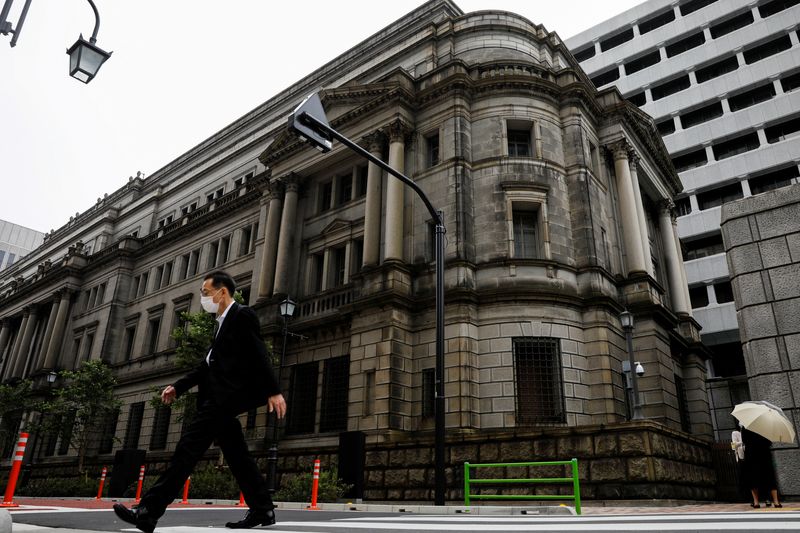By Leika Kihara and Takahiko Wada
TOKYO (Reuters) -The Bank of Japan will consider downgrading its assessment on factory output at this month's policy meeting, sources said, as supply disruptions caused by China's strict COVID-19 lockdowns take a heavy toll on the economy.
The central bank may also warn of heightening risks to the global economy and exports, as China's slowdown and the fallout from Russia's invasion of Ukraine cloud the outlook, they said.
But the central bank is likely to maintain its view that the world's third-largest economy is "picking up as a trend", as an expected rebound in consumption offset some of the weakness in output, said three sources familiar with its thinking.
"While the economy may have experienced temporary weakness in April-June, the economy's recovery path remains intact," one of the sources said on condition of anonymity, a view echoed by two more sources.
In its most recent assessment made in April, the BOJ said output and exports "continue to increase as a trend".
The downgrade would highlight the fragile nature of Japan's recovery, as the outlook for manufacturers darkens even before consumption manages a solid rebound from the pandemic's hit.
The BOJ will review its economic and price assessment at its next policy meeting on June 16-17, when it is widely expected to maintain its ultra-low interest rate policy.
Japan has lagged other major countries in pulling its economy out of the pandemic-induced doldrums, as wariness over COVID-19 infections kept households from boosting spending.
While consumption is likely to rebound with a loosening of domestic coronavirus curbs, China's COVID-19 lockdowns have disrupted supply chains and Japanese automobile production.
Data released last week showed factory output slumped 1.3% in April, and analysts expect another big drop in May as the fallout from China's lockdowns persists.
Toyota Motor (NYSE:TM) Corp has announced plans to cut its global production plan for June.
For now, many BOJ officials expect the recent end to Shanghai's lockdown will gradually ease output disruptions and help to keep the economy on track for a moderate recovery, the sources said.

The BOJ may also offer a slightly more upbeat view on consumption, as a loosening of COVID 19-related curbs draws more people to shops and restaurants, they said. In its most recent assessment, the central bank said consumption "appears to be picking up".
But soaring global commodity costs have led to a wave of price hikes for fuel and food products, pushing up living costs for households that have yet to see wages rise.